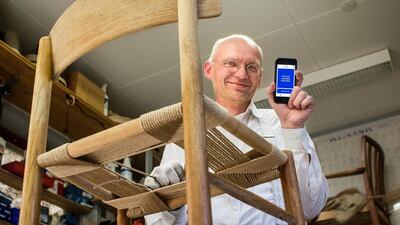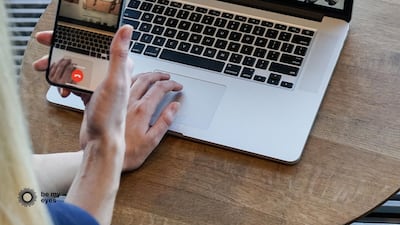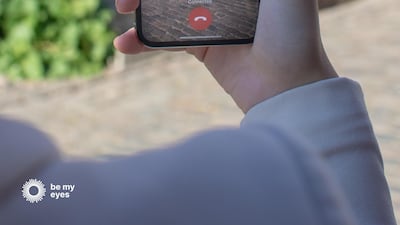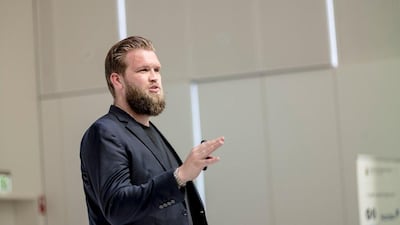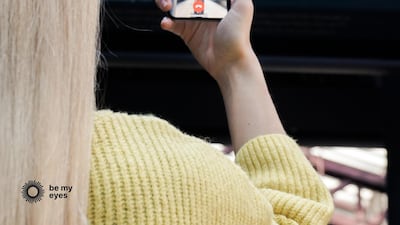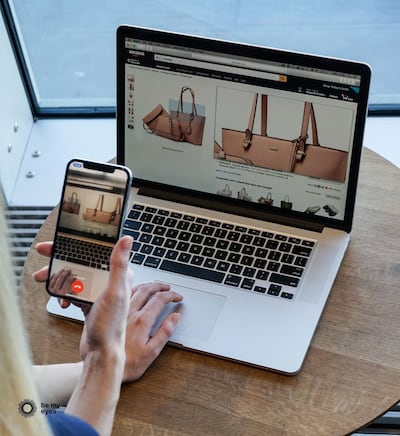Checking the expiration date on a carton of milk may seem like an everyday task for most people.
For the visually impaired, it can be the hardest.
Blind or low-vision people often have to rely heavily on the help of others to perform simple functions, like reading instructions and distinguishing colours, which can erode their sense of independence.
But a new app designed with the focus on inclusion and accessibility is putting the power back in their hands.
Be My Eyes is a free service that pairs visually impaired people with sighted volunteers through video calls.
Hans Jorgen Wiberg, 57, and Christian Erfurt, 34, both from Denmark, are the men behind the app.
“I met Hans, the co-founder and inventor, during a start-up competition I was organising in 2012,” said Mr Erfurt, chief executive and co-founder of Be My Eyes.
“He is visually impaired and presented the idea to me and I fell in love with it. The random act of kindness element really appealed to me.
“Since we’ve been up and running we’ve helped new mums-to-be read pregnancy test results and in one case, years after his father passed away, we were able to help a man visit his father’s graveside on his own for the first time.
“These are really intimate moments for people and it's a proud moment to know we can help them.”
Globally, at least 2.2 billion people have a near or distance-vision impairment.
The app was launched in 2015. In the first 24 hours of going live, more than 10,000 volunteers from around the world signed up.
Today, more than 4.8 million volunteers are on hand to serve 313,000 visually impaired users on the app.
In the UAE, the app has about 5,000 volunteers and 2,000 blind or visually impaired users.
Be My Eyes was chosen as one of the projects under the Expo Live initiative, which aims to inspire visitors to become change-makers.
The Expo 2020 Dubai programme highlights social innovators and funds and supports creative and innovative solutions that improve people’s lives, preserves the planet, or both.
How does it work?
Sighted volunteers “lend their eyes to solve tasks, big and small”, to help blind and low-vision people lead more independent lives.
After downloading the app on Android or iPhone, users and volunteers select their first and second language, if applicable.
Each call is then matched to a volunteer, based on two elements: time zone and language.
Once a visually impaired user presses the call button, most calls are answered within 15 seconds and the video chat starts.
“Volunteers are not disturbed between the hours of 10pm and 7am, so if a user is looking to speak to someone in Danish but it's 3am in Denmark, they can be matched with a Danish speaker in Australia, for instance,” Mr Erfurt said.
“Our research showed us that people find it tough having to rely on friends or family all the time.
“They don’t like having to call them for help at a time that might not be convenient for the person on the other end of the phone.
“Volunteers on Be My Eyes have been chosen to take a call and are on hand to help, so the users don’t have to worry about disturbing someone’s day.”
Mr Erfurt said the most common language in use on the app, which is active in more than 150 countries, is English.
Its biggest market is the US.
Portuguese is another popular language, as people in Brazil and Portugal are often matched for video calls.
Other languages that are growing in use include Arabic, Hindi and Urdu.
There are more than 50,000 blind or visually impaired Arabic users and more than 350,000 Arabic volunteers.
“Those everyday tasks that we find simple are often the same ones that require a lot of planning for people who are visually impaired,” Mr Erfurt said.
“Be My Eyes is important because it’s a visual interpretation tool for anyone, anywhere and it’s building a two-sided community, an inclusive community.
“It’s helping to minimise the gap between us and them, which is healthy in this current climate where, although we’re in a world that is connected, so many people still feel lonely and isolated.”
